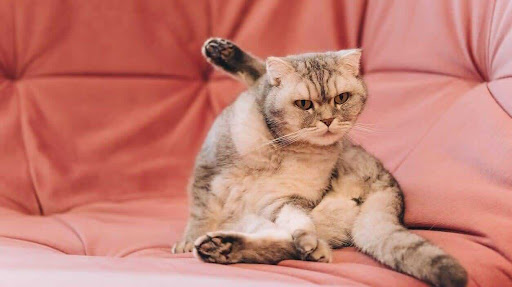Wait! Did you notice anything stinky, poopy-like smell whenever your cat passes you? Yeah it can happen. I know we all agree that cats themselves are very much self-cleaning creatures. And like me, those who own one, we often notice that either our cat is taking a nap or simply licking their fur – quite obvious for having a self cleaning thing! So How to Stop My Cats Bum From Smelling?
When we have to deal with some unpleasant odor, especially emanating from their butt, that can be quite distressing. Therefore, today I’ll delve into the causes of smelly bum and what you can do to fix this issue.
Is It Normal For a Cat’s Bum to Smell
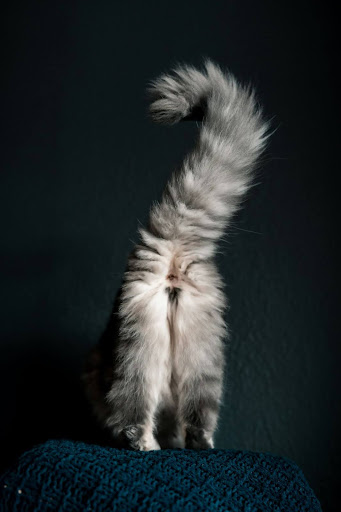
Cats are known for being clean and self-grooming animals, but sometimes they may have a smelly bum that can make you wonder if something is wrong.
While a mild odor from your cat’s rear end is normal and part of their natural scent, a strong or unpleasant smell can indicate a problem that needs your attention.
There are several possible causes of a smelly cat bum, such as anal gland issues, poor hygiene, poor diet, and health conditions. Some of these causes are more serious than others and may require veterinary intervention.
Therefore, it is important to monitor your cat’s butt and poop for any changes in smell, appearance, or behavior.
What Causes Smelly Cat Bum
Have you ever wondered what could be behind that less-than-pleasant aroma emanating from your cat’s bum? Well, there are several potential causes to consider:
Anal Gland Issues
These are two small sacs near your cat’s anus that contain a strong-smelling fluid normally expressed during bowel movements. However, they can sometimes become impacted, infected, or abscessed, leading to a strong, fishy odor.
Digestive Problems
If your cat’s experiencing diarrhea, constipation, or even just some rumbles in the tummy, it can affect the consistency and smell of their stool, impacting the overall “fragrance” of their backside. This could be due to dietary changes, intolerances, or more serious health issues.
Poor Hygiene
As cats age, become overweight, or encounter difficulties due to arthritis, their self-grooming prowess might wane. This can lead to fecal matter building up around their bum, creating an unpleasant odor.
Matted Fur
For our long-haired feline friends, tangled fur around their rear end can act as a poop trap, leading to trapped waste and a less-than-fresh aroma.
Skin Infections or Parasites
Fleas, mites, and fungal infections can irritate your cat’s skin, leading to excessive scratching and licking, which can create a smelly mess. Bacterial or yeast infections can also contribute to odor.
Underlying Medical Conditions
In some cases, a smelly cat bum can be a sign of a more serious health problem like inflammatory bowel disease, liver disease, or even diabetes.
Poor Diet
Poor-quality food can lead to digestive issues and contribute to a stronger odor. Consider switching to a high-quality cat food appropriate for your cat’s age and needs.
How to Stop My Cats Bum From Smelling
While a faint, musky scent from your feline friend’s backside is normal, let’s face it, nobody wants a stinky situation! Luckily, you can take steps to minimize unpleasant odors and keep your cat (and your home) smelling pawsome.
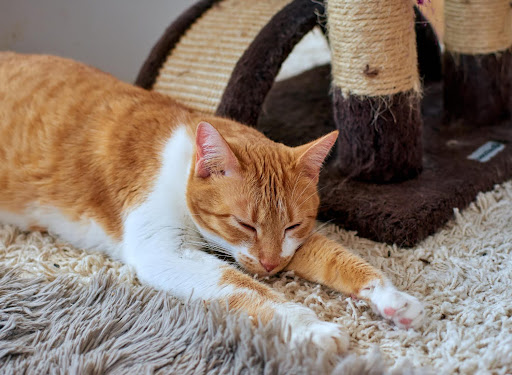
Proper diet
- High-quality food: Feed your cat a premium diet packed with fiber to aid digestion and firm up stool, reducing the likelihood of messy situations. Consult your vet for recommendations based on your cat’s age and needs.
- Hydration: Ensure your cat has constant access to fresh, clean water. Dehydration can worsen digestive issues and contribute to odor.
- Monitor treats: Limit sugary or fatty treats, as these can disrupt digestion and create unpleasant smells.
Regular grooming
- Brushing: For long-haired cats, brush them regularly to remove loose fur and prevent mats from forming around the hindquarters.
- Trimming: Trimming long fur around the bum area can make grooming easier and prevent mess buildup.
- Cleaning: Gently clean around the anal area with pet wipes specifically designed for cats, especially if your furry friend struggles with self-grooming.
- Washing: Consult your vet before bathing your cat, as frequent baths can disrupt their natural oils.
Proper Hygiene
- Help with self-grooming: Help your cat with self-grooming, especially if they’re older or have mobility issues. Pay special attention to cleaning their bum area to prevent odor-causing buildup.
- Litter box care: Keep your cat’s litter box clean by scooping it daily. Change the entire litter regularly (every 1-2 weeks) to minimize odor build-up. A clean litter box encourages proper elimination habits and prevents fecal contamination.
More for you → Best clumping litter to prevent odor after your cat pooped.
- Wipe away messes: If your cat has diarrhea or messy stools, gently wipe away messes afterwards to prevent lingering smells and discomfort.
Veterinary check-ups
- Schedule regular checkups: Schedule routine vet visits to catch any underlying medical conditions that might contribute to odor, like allergies or infections.
- Anal gland expression: Discuss anal gland expression with your vet. If necessary, have your vet express your cat’s anal glands to prevent blockages and potential infections.
- Rule out parasites: Treat your cat regularly for fleas and other parasites with vet-approved products to prevent infestations that can irritate their skin and cause odor.
Maintain a healthy weight
Overweight cats might struggle with grooming and experience anal gland issues. Help your cat lose weight by providing a balanced diet, limiting treats, and encouraging exercise and play.
Consider supplements
Probiotics, fish oil or fiber supplements might improve digestion and reduce odor under veterinary guidance. So, discuss with your vet whether probiotics might be beneficial for your cat’s gut health and potentially reduce odor.
Also read → Best food to help you hide pills for your cat’s medication.
Home Remedies for Stinky Cat Bum
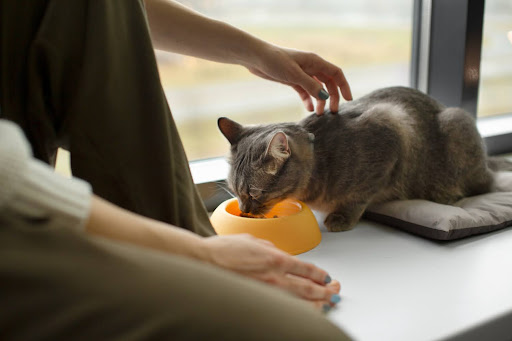
Though home remedies won’t help you if your cat has serious issues like anal gland problem, infection or more serious. But if you are talking about cleaning their butt, preventing odor or you know, poopy itself is a stinky waste, like that you can try some home remedies to deal with the cat ‘s smell. Here are some general approaches that may help:
Apple cider vinegar solution
Mix equal parts of apple cider vinegar and water to create a gentle solution.
Use a clean cloth or cotton ball soaked in the solution to gently wipe your cat’s bum area. Though it has natural antibacterial and antifungal properties, do not use it for daily cleaning purposes.
Baking Soda solution
This common household item can neutralize odors. So, you can sprinkle some on your cat’s litter box.
Focus on gentle cleaning
If appropriate, you can gently clean the anal area with warm water and a soft washcloth. Be very gentle and avoid using harsh soaps or chemicals.
Increase fiber intake
Adding a small amount of canned pumpkin (not pie filling) to your cat’s food can help firm up stool and promote natural anal gland expression. Always consult your vet before making dietary changes.
It’s important to remember – before trying any home remedy, discuss it with your veterinarian. They can advise on its safety and effectiveness for your cat’s specific situation.
Monitor your cat closely after trying any home remedy. Look for any signs of irritation, discomfort, or worsening symptoms. If you see any, stop using the remedy and consult your vet immediately.
Additionally, never attempt to express your cat’s anal glands at home unless trained by a veterinarian. This can be a painful and risky procedure if done incorrectly.
Don’t use human products on your cat, including wipes, shampoos, or medications. These can be harmful or irritate your cat’s skin.
When to Seek Veterinary Help
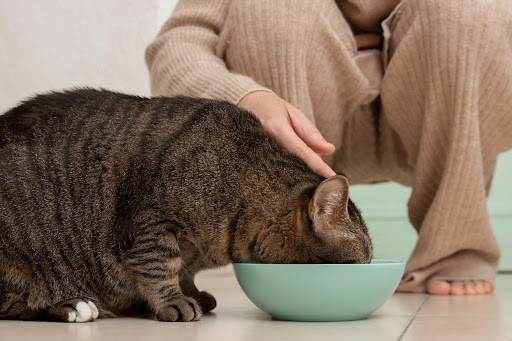
You should seek veterinary help for your cat’s smelly bum in several situations, ranging from urgent cases to situations warranting closer monitoring. Here’s a breakdown:
You should seek veterinary help for your cat’s bum smelling if the smell is accompanied by concerning symptoms:
- Lethargy
- Vomiting
- Diarrhea, especially with blood or mucus
- Scooting on the ground
- Difficulty passing stool
- Redness, swelling, or discharge around the anus
- Fever
- Loss of appetite
Along with these symptoms, schedule a vet appointment within a few days if:
- Persistent odor: The smell persists even after you’ve tried at-home remedies like gentle cleaning and dietary adjustments.
- Behavioral changes: Your cat seems uncomfortable or bothered by the smell, such as excessive licking or scratching around the area.
- Noticeable changes in poop: You notice changes in your cat’s stool, such as consistency, color, or presence of blood.
Early diagnosis and treatment are crucial for any underlying medical conditions that might be causing the odor. Your veterinarian can perform a thorough examination and recommend the best course of action, which may include medication, dietary changes, anal gland expression, or further diagnostics.
So, don’t wait for the problem to worsen.
It’s better to be safe than sorry and consult a vet as soon as possible if you notice any of these signs. Seeking veterinary help promptly will ensure your cat’s comfort and well-being.
Frequently Questions Asked
Can I use baby wipes on my cat?
No. While seemingly gentle, baby wipes might contain fragrances, chemicals, or alcohol that can irritate your cat’s skin. Use pet wipes specifically formulated for cats.
How often do cats need their anals expressed?
Most cats express their anal glands naturally during bowel movements. Routine expression by owners is not recommended as it can irritate the glands. But if it’s about chronic anal gland problems then gland expressions are required every 3 to 4 weeks.
How often should I bathe my cat?
Cats are meticulous groomers and bathing them rarely, if ever, is necessary. Frequent baths can disrupt their natural oils and dry their skin. However, you can bath them once every four to six weeks. Consult your vet before bathing for specific needs.
How do I know if my cat has UTI?
Symptoms include frequent urination, straining to urinate, blood in urine, and discomfort. If you notice any of these, consult your vet immediately for diagnosis and treatment.
How do you deodorize a stinky cat?
You don’t have to bathe your cat frequently, but a cat conditioner or a leave-in treatment can make their fur nicer and less smelly. Try the High Maintenance Leave In Conditioner for spoiled cats who need some odor control.
However, focus on the cause, not the cover-up. A persistent odor suggests an underlying issue. Always consult your vet first for proper diagnosis and treatment. They can advise on safe cleaning methods and address the root cause of the odor.
Conclusion: A Fresh Solution for Foul Odors
Preventing your cat’s bum from emitting unpleasant odors requires a multifaceted approach that addresses both hygiene and health factors. By incorporating regular cleaning, dietary adjustments, hydration, veterinary care, and stress reduction strategies into your cat care routine, you can effectively combat smelly stool and enjoy a fresher, more pleasant environment for you and your furry friend.
If you found this article helpful, please share it with other cat owners and leave a comment below. We would love to hear your feedback and tips on How to Stop My Cats Bum From Smelling and how to keep your cat’s bum fresh and clean.

